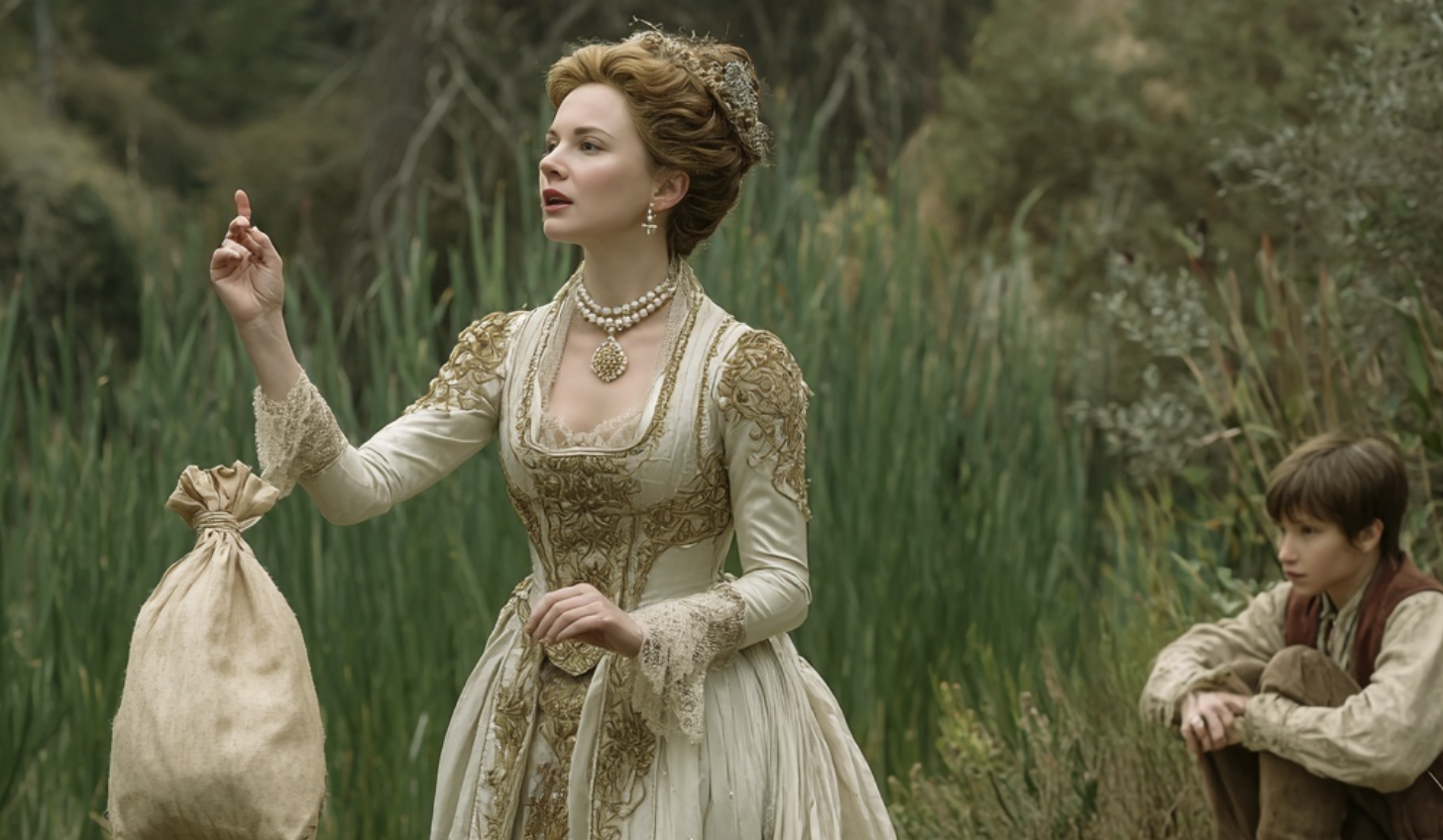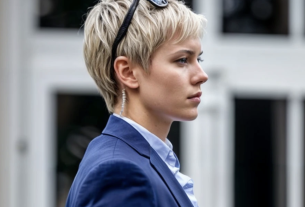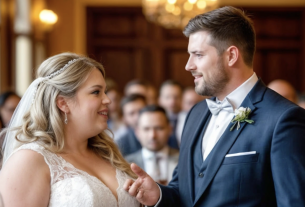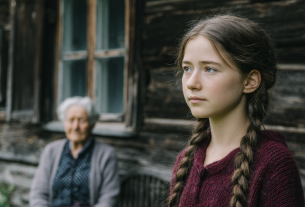May draped the park in mellow gold. On the grass sat Lyova and Misha—matching school trousers, blue shirts, knees grass-stained—while a shaggy Alabai sprawled beside them at full puppy stretch. Rex’s nose was wet, his eyes uncannily gentle.
“Watch this,” Lyova said, grinning as he held out his hand. “Rex, paw!”
The pup sprang up, bumped his nose into Lyova’s palm, and set a giant paw on it with solemn care. Misha burst out laughing. Taking that as an invitation, Rex barreled over, toppled him flat, and washed his face with sloppy kisses until both boys were shrieking. For a moment it was all limbs and fur, impossible to tell where the dog ended and the boys began.
“You spoil him,” Misha said, breathless, picking grass from his hair.
“How could I not?” Lyova brushed grit from his knee. “He’s my best friend. And the smartest dog alive.”
Rex, as if seconding the motion, nudged Misha’s hand and thumped his tail across the grass.
“I wish I’d had a dog,” Misha murmured, stroking the soft head.
“Well, now you’ve got me—and Rex,” Lyova said, clapping his shoulder. “Tomorrow I’ll bring treats from home. He deserves to be spoiled.”
The sun tilted toward evening. Lyova stood, dusting off his trousers.
“I’ve got to go. Dad worries if I’m late. You’ll come tomorrow, right? I’ll be waiting.”
Misha nodded, though a tight, nameless feeling pressed at his chest. He watched Lyova leave with Rex bouncing at his side. The clearing felt too big once they were gone. He headed home, hoping tomorrow would be good, even as unease tugged at him.
The apartment door complained on its hinges. Misha slipped off his shoes. The air held the familiar mix of medicine, old wood, and the fragile thread of hope. His mother, Marina, lay on the couch under a blanket, a book open but her gaze far beyond the window.
“Hi, Mom,” he said softly.
“Back already?” Marina’s smile was tired but warm. “How was the park?”
“Great. Lyova taught Rex to give his paw. He’s ridiculous.”
“I’m glad you’ve got a friend,” she said, smoothing his hand. “You’ve always got me, too.”
For an instant, other evenings bloomed in his mind—Dad bringing home ice cream, the smell of fried potatoes, the three of them laughing at some silly movie. Home had been simple then. Safe.
Then everything tilted. Marina slipped on the stairs, hurt herself badly, and there were hospitals, white walls, careful voices. At home came pill bottles, quiet, and the soft clatter of tablets in the night. Dad was around less, then not at all; one afternoon he packed a bag and slammed the door. Marina wept, and Misha had no idea how to hold her so the ache would stop.
Grandma Valentina Nikolaevna swept in, scolded Dad, baked pies, and left just as abruptly. In the end the family was two—mother and son—learning to balance with one another as their only constant.
The next day, Lyova showed up changed. His lively face was tight; there was worry in his eyes.
“Things are bad,” he said as Misha approached. “Dad’s going on a business trip, and Inga’s moving in. She likes no one but him. She even scolds Tamara Semyonovna.”
“Maybe she just needs time?” Misha offered, without believing it.
Lyova shook his head. “She’s mean on purpose. And she hates Rex. Says he’s filthy, a nuisance. Dad got him for my birthday—I wished for a dog forever.” He paused, then brightened a little. “At night Rex sneaks into my bed and falls asleep on my feet. We’re like brothers. But now Inga forbids everything. She won’t even let me walk him.”
They sat a while without talking, both thinking their own thoughts.
Lyova left early and then didn’t come back for several days. Misha told himself it was nothing, that it would sort out. Still, the thought kept circling: someone had to walk Rex.
One morning he set his alarm for five and went to the river. The park was empty save for bird chatter in the bushes. He tucked himself behind a thicket and waited.
A silver car rolled up. A tall woman got out—bright scarf, hard eyes, sharp makeup. She hauled a heavy, shifting bag from the trunk and heaved it toward the water.
Misha went cold. Before he could think about fear, he was in the river, the water biting him to the bone. He caught the bag, dragged it ashore, and tore at the knot with shaking fingers. Inside, muzzle taped, was Rex—terrified, but alive.
“Easy, boy,” Misha whispered, peeling away the sticky tape. He hugged the trembling dog to his chest. “You’re safe. I’ve got you.”
Rex shook and then licked Misha’s cheek, a wet, grateful swipe. In that second, Misha decided: he wouldn’t give this dog up to anyone.
When he got home, soaked and shivering with a huge pup bundled in a blanket, Marina hurried to meet him.
“What on earth—?”
“It’s Rex,” Misha choked out. “Someone tried to drown him. I saw the woman throw him in. I couldn’t leave him.”
Marina knelt and gathered them both in—boy and dog, both shaking.
“You did the right thing,” she said. “We’ll figure out who it was. Did you see her well?”
“Yes. Tall. Bright scarf. Silver car. We have to tell Lyova. He needs to know.”
Marina smoothed his hair. “Rex stays here for now. Until we sort this out, he’s with us.”
At first light, Misha went to Lyova’s house. He hovered by the wrought-iron fence, watching the windows. Lyova came onto the porch with his father—Herman Arkadyevich—stern, immaculate, trying to soothe his son.
“Don’t worry,” Herman said. “Maybe Rex got out. We’ll find him.”
“No,” Lyova said, fists clenched. “It was Inga. She was furious at him yesterday. Now he’s gone.”
Herman frowned. “Don’t accuse without proof. Inga wouldn’t—”
Misha couldn’t hold back. He ran from hiding.
“I saw it!” he shouted. “Bright scarf. Silver car. She threw a bag into the river—Rex was inside. I pulled him out. He’s at my place.”
Herman turned sharply. “Are you sure that was Inga?”
Lyova nodded, eyes blazing. A silver car purred up the drive. Inga stepped out, the same scarf thrown over her shoulder, and froze at the sight of them.
“Inga,” Herman said, his voice gone cold. “We’re going inside. Now.”
She opened her mouth to protest. He didn’t give her the chance. “Wait here,” he told the boys, and disappeared with her behind the door.
Fifteen minutes later he returned, pale and set.
“Where is Rex?” he asked Misha. “Take me to him.”
At the apartment, Marina greeted them carefully. Herman stopped short, staring—and then smiled with startled warmth.
“Marina? It’s you? We were in school together. Do you remember the wooden doghouses… and stealing apples from the neighbor’s tree?”
Marina flushed, then laughed. “You always were the top student.”
While the adults traded old stories in the kitchen, the boys and Rex turned the living room into a festival—running, hugging, the dog weaving between them with joyous barks. Gratitude filled the flat: the puppy was safe, and somehow their friendship felt sturdier than before.
Over tea, Marina’s voice softened. “Sometimes it feels like things will never get better. Then someone appears, and—suddenly—they do.”
“The trick is not giving up,” Herman said, studying her. “You can start again. Most people underestimate that.”
Their eyes lingered a beat too long to be only about the past.
Herman pressed some money into the boys’ hands. “Go get something for a celebration. And come over later. We’ll make a night of it.”
They tore to the shop and came back with chips, ice cream, and candy. At Herman’s house, Marina helped Tamara Semyonovna slice salad; the housekeeper slid her famous pies into the oven. Laughter gathered around the table, stories flowed, and no one mentioned Inga. Her things were already gone, as if she had never been there.
It felt warm and impossibly normal. For a while, it seemed every hard thing had been left outside the door.
Late that night, while the grown-ups lingered over tea, the boys sprawled in Lyova’s room.
“Do you think we’d be happier if our parents were together?” Lyova asked, thoughtful.
“Obviously,” Misha said, grinning. “You’d be my brother. Rex would be our dog.”
“Let’s test them,” Lyova whispered, conspirator’s spark in his eyes. “We’ll leave a note: we’ve run away and won’t come back unless they agree to get married.”
They giggled, wrote it out, and placed the message on the kitchen table like a dare.
Morning brought commotion. Marina couldn’t find her son; Herman checked every room. He spotted the note first, read it, and—unexpectedly—laughed.
“Little rascals,” he said, shaking his head. “Seems we’re cornered.”
They stepped outside, and there were the boys behind the bushes, waiting with wide, nervous smiles.
“Well,” Herman called, smiling back, “shall we make a deal?”
Marina nodded, shy but bright with hope.
Tamara Semyonovna waved them in, laughing. “All right, you two! Come home. The adults agreed to everything already!”
Misha and Lyova sprinted forward; Rex leaped around them, barking in dizzy circles. There were hugs and a clatter of laughter, and the sun seemed to break the clouds just for them.
And after that, life remembered how to be kind.



